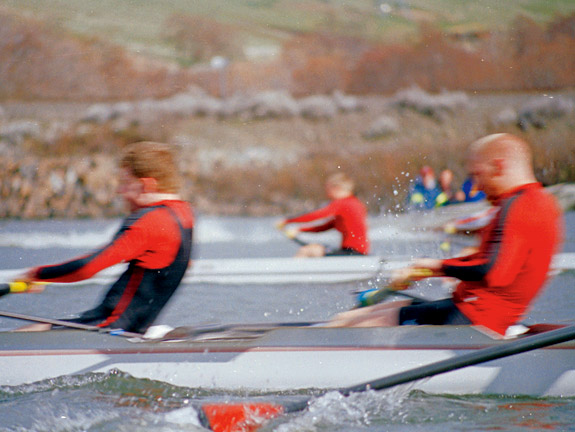Eight graying heads lean forward in unison and then back as 16 oars slide into the water and propel the boat forward. A racing shell of 50-somethings streaks by the Wawawai Landing as a crowd of more than three dozen Washington State University’s men’s crew alumni gather around the boathouse on the shores of the Snake River.
It is Saturday, March 15, and regardless of a chill wind and choppy waters, former team members have come from as far as Brazil for the annual Cougar Crew Days, a weekend event allowing current and former oarsmen, coxswains, and coaches, along with family and friends, to gather and celebrate WSU Men’s Crew.

“They call it the ‘Viagra 8’,” says Tim Richards ’81, DVM ’84 jokingly about the boat in which he and seven other Cougar alumni briefly relived the glory days of Cougar Crew. “Getting back out there and pulling a blade gets the heart going,” he says. And not just literally.
For many students and alumni, crew isn’t something you let go of the day you graduate.
“You have tremendous respect for everyone because you know what they did for years, just like we did,” says Danny Brevick ’05. On top of more than 30 hours a week of practice time, men’s crew is almost entirely self-regulated and funded. Members constantly balance roles as students, team officers, fund raisers, and, of course, athletes. And considering the club’s operating budget for a given season is more than $110,000, what they have managed is a lot. The team continues to compete as a varsity-level sport while still technically classified as a club sport.
“Being a part of Cougar Crew meant you had to work extra hard,” says Lisa Curtis, a coxswain for the team in 1979. “It instilled an incredible work ethic and pride.” It’s that bond between athlete and alumni, the determination, dedication, and hard work, which makes Cougar Crew Days so special.
This year, members representing more than 30 years of crew history turned out.
The annual event had lapsed for a time after the men’s sport was moved from a university-sponsored sport to a club sport. “I remember thinking it’d be easier to raise the dead than get the alumni back together,” says Richards, now chair of the Cougar Crew Alumni Association. “But we’ve gotten beyond that and moved forward.” Team members and alumni affectionately refer to it as “the reconnection,” a reestablishment of ties and the beginning of the Cougar Crew Alumni Association (CCAA). Composed of team members from as far back as the 1950s, the association helps manage the business side of crew responsibilities so the team can focus less on money and more on racing, Richards says.
A CCAA-sponsored auction during Cougar Crew Days is just one way they help ease the team’s financial woes. This year’s auction brought in around $10,000. In addition, WSU University Recreation support accounts for roughly a fifth of the overall team budget at about $20,000.
Even with CCAA and UREC support, the team still bears much of the burden to raise funds for everything from coaches’ salaries, plane tickets, and uniforms to boats and repairs. So the team does its own fund-raising. Commercials for “Rent-a-Rower” weekends can be heard often on local radio stations with team members offering their brawn for services like moving furniture, raking leaves, and painting houses at the rate of $10/hour. The team also offers community learn-to-row sessions in the summer for all ages and skill-sets.
Besides help with fund-raising, the alumni provide valuable experience and mentor their successors. “It’s all about relationships,” says Brevick, who had pushed to reestablish ties with the alumni four years ago. “We were constantly fighting the same battles and if we were going to advance we needed the alumni’s help”—alumni who had the wisdom, leadership, and management skills that the team needed, says Brevick.
“Without the alumni we wouldn’t have the connection between present and past teams,” said Lauren Curtis, Lisa’s daughter, a second-generation coxswain. “That’s something that has really helped us grow.”
